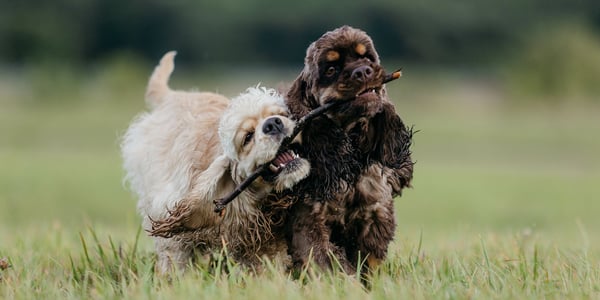Unleash the Potential: Essential Cocker Spaniel Training Tips for a Well-Behaved Companion
Index:



Introduction
Bringing home a new Cocker Spaniel puppy is an exciting adventure, but it also comes with the responsibility of training, especially for first-time cocker spaniel owners.
Cocker Spaniel puppies are intelligent and eager to please, making them easy to train with the right approach.
This guide covers everything you need to know about training your Cocker Spaniel puppy to become a well-behaved and loving companion.
Start early with basic obedience
It's never too early to begin training your Cocker Spaniel. As soon as you bring your new puppy home, start with basic obedience training.
Teaching your puppy essential commands like sit, stay, and come will set a strong foundation for future training.
Positive reinforcement is key when training Cocker Spaniels. Reward your puppy with treats, praise, or playtime when they follow commands correctly. This encourages them to repeat the desired behaviour.
Crate training: Creating a safe haven
Crate training is an essential part of raising a well-behaved Cocker Spaniel. A crate provides a safe space for your puppy and aids in house training.
Make sure the crate is large enough for your dog to stand up and turn around comfortably.
To make the crate appealing:
Place it in a common area of your home
Add comfortable bedding and toys
Feed your puppy meals inside the crate
Never use the crate as punishment



Potty training: Consistency is key
Potty training your Cocker Spaniel requires patience and consistency. Establish a routine for taking your puppy outside:
First thing in the morning
After meals
Before bedtime
Every 1-2 hours during the day
When your puppy goes outside, offer praise and a treat. If accidents happen indoors, clean thoroughly to remove odours that might attract your puppy back to the same spot.
Leash training: Mastering loose lead walking
Cocker Spaniels have a natural tendency to pull on the leash due to their hunting instincts.
Start leash training early to ensure your dog learns to walk on a leash properly.
Begin with short sessions indoors, rewarding your puppy for walking beside you.
Gradually increase the duration and move outdoors. If your dog pulls, stop walking and only continue when the leash is loose.
Socialisation: Building confidence
Proper socialisation is crucial for preventing behavioural issues like separation anxiety or Cocker rage.
Expose your puppy to various people, animals, and environments in a positive way.
Consider enrolling in puppy obedience classes for structured socialisation opportunities.
These classes also provide mental stimulation and reinforce basic commands.



Advanced training and tips for your Cocker Spaniel
As you progress in training your Cocker Spaniel puppy, remember that consistency is key.
Your puppy's development relies on regular practice and patience.
Don't forget that adult Cocker Spaniels also benefit from ongoing training to maintain their skills and mental acuity.
In essence, perhaps you really can teach your dog new tricks, even if they're a little older.
When selecting a breeder, ensure they provide health clearances and allow you to meet the puppy's parents.
A reputable breeder will be a great help in understanding your new puppy's needs and temperament.
For more guidance on choosing the right puppy, check out our advice on buying a dog.
Cocker Spaniels also excel as working dogs, particularly in hunting and agility tasks. Their natural instincts make them quick learners, but remember that training a dog may take time and effort.
Giving your puppy plenty of physical and mental stimulation is also crucial for their well-being.
Consider using licky mats for dogs as a fun and engaging activity. To enhance your training sessions and enforce patience when eating.
To reiterate the most important points:
Use positive reinforcement - give your dog a treat for good behaviour.
Keep sessions short - your dog's attention span is limited.
Be consistent - ensure all family members follow the same rules.
Socialise early - expose your puppy to various people, animals, and environments.
Use a variety of training methods - mix obedience work with fun games.
Remember, every dog may respond differently to training methods, so be prepared to adjust your approach.
Want your puppy to be well-behaved? Start with basic training and gradually increase the difficulty. For tips on specific commands, learn how to teach a dog to roll over.
For those interested in more advanced techniques, consider enrolling in puppy obedience training classes. These can be a valuable resource for both you and your Cocker Spaniel.
Waggel members have access to free behavioural training with our residence expert, Junior. Not a member? Get a quote today to see how much it would cost to protect your dog and your wallet!
Don't forget to consider puppy insurance to protect your new furry friend throughout their training journey and beyond.
Addressing the Spaniel's natural instincts
As gundogs, Cocker Spaniels have strong hunting instincts. They love to carry things in their mouths and have a strong desire to sniff and explore. Channel these instincts positively:
Teach a reliable "drop it" command
Provide puzzle toys for mental stimulation
Engage in scent work games
Dealing with common challenges
Cocker Spaniels can be prone to certain behavioural issues. Be prepared to address:
Excessive barking
Chewing
Jumping up on people
Resource guarding
Consistent training and early intervention can help prevent these problems from developing.
Maintaining training throughout adulthood
Training doesn't stop when your puppy becomes an adult dog. Continue reinforcing commands and good behaviour throughout your Cocker Spaniel's life.
Regular training sessions provide mental stimulation and strengthen your bond.
Remember, every dog is unique, and the training process may vary. Be patient, consistent, and always use positive methods. With time and effort, your Cocker Spaniel will become a well-mannered and joyful companion.
For more information on caring for your Cocker Spaniel, including health considerations and insurance options, explore our other resources to ensure you're providing the best care for your furry friend.



FAQs
How do you begin to train a Cocker Spaniel pup?
To train a Cocker Spaniel pup, start with basic commands like "sit," "stay," and "come." Consistency, patience, and positive reinforcement using treats and praises are key in puppy training.
You’ll want to get your pup accustomed to short training sessions to keep them engaged.
What are the most important tips for training your Cocker Spaniel puppy?
The most important tips for training your Cocker Spaniel puppy include starting early, being consistent with commands, using positive reinforcement, and socialising your puppy with other dogs and people.
Training your puppy with patience will ensure you develop a well-behaved adult dog.
How can I effectively toilet-train my Cocker Spaniel puppy?
To effectively toilet train a Cocker Spaniel puppy, establish a routine by taking your puppy outside frequently, especially after eating or drinking.
Praise and reward your puppy each time they go in the right place. Be patient and avoid punishment, as it might cause confusion and anxiety.
What is the best way to handle separation anxiety in cocker spaniel puppies?
The best way to handle separation anxiety in Cocker Spaniel puppies is to gradually get them used to being alone. Start with short absences and slowly increase the duration.
Provide engaging toys and ensure your pup gets plenty of exercise to reduce anxiety levels. Consistency and calm departures will ease their fears.
Are Cocker Spaniels easy to train?
Cocker Spaniels, as a breed, are generally eager to please and intelligent, making them relatively easy to train.
However, consistency, patience, and positive reinforcement are essential to successfully train a Cocker Spaniel. Early socialisation and obedience training are also recommended.
How can I teach my Cocker Spaniel puppy to sit?
To teach your cocker spaniel puppy to sit, hold a treat close to their nose and slowly move it upward.
As your pup's head moves up, their bottom will naturally go down.
As soon as they sit, say "sit" and reward them with the treat and praise. Repeat consistently until your puppy learns the command.
What should I do if my Cocker Spaniel becomes too distracted during training sessions?
If your Cocker Spaniel becomes too distracted during training sessions, choose a quiet environment with minimal distractions. Keep training sessions short and engaging. If the dog becomes too restless, consider exercising them before training to burn off excess energy. Using high-value treats can also help maintain their focus.
When should I start training my Cocker Spaniel puppy?
You should start training your cocker spaniel puppy as soon as you bring them home.
Early training helps establish good habits and prevents unwanted behaviours.
Begin with simple commands and gradually progress to more complex tasks as your puppy learns and matures.
How can socialisation benefit my Cocker Spaniel pup?
Socialisation is crucial for a Cocker Spaniel pup as it helps them become well-adjusted and confident adults.
Exposing your pup to different environments, people, and other animals reduces anxiety and fear.
Socialisation also improves your dog's behaviour and reinforces positive interactions.
What techniques can I use to teach my cocker spaniel not to bark excessively?
To teach your Cocker Spaniel not to bark excessively, identify the triggers causing the barking and work on desensitisation.
Training commands like "quiet" can be useful. Reward your dog for being quiet and avoid reinforcing barking by giving attention. Consistent training and patience are key to curbing excessive barking.
Waggel Pet Insurance
Need more help? You're in luck if you're a Waggel Pet Insurance member. Along with our excellent coverage, we offer access to a 24/7 online vet to answer all your sticky questions, especially if you need grooming assistance.
Not a member? Why not get a quote now and cover your furry friend for a range of illnesses, all while enjoying our amazing perks and rewards.
Want more like this?
Get updates from us with helpful info, advice, answers to frequently asked questions and much more.
Index:
- Introduction
- Start early with basic obedience
- Crate training: Creating a safe haven
- Potty training: Consistency is key
- Leash training: Mastering loose lead walking
- Socialisation: Building confidence
- Advanced training and tips for your Cocker Spaniel
- Addressing the Spaniel's natural instincts
- Dealing with common challenges
- Maintaining training throughout adulthood
- FAQs
Related posts:
Get your quote
Along with our excellent coverage, we offer access to a 24/7 online vet to answer all your sticky questions.





